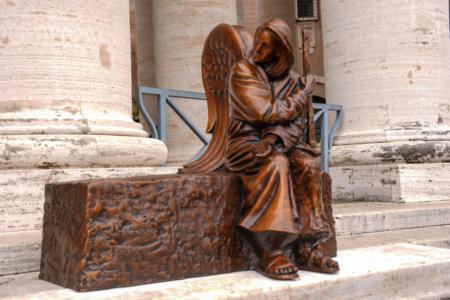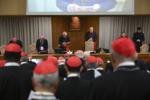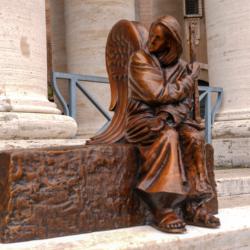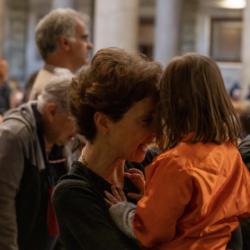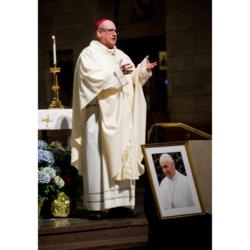Stem cells, marriage, death penalty on plate at Statehouse this year
BOSTON — As the 184th General Court of the Commonwealth of Massachusetts begins its session, legislators will once again be considering several issues of great importance to Catholics.
One of the hottest issues on Beacon Hill this year is likely to be embryonic stem-cell research.
During his Jan. 5 inaugural address, Senate President Robert Travaglini, D-Boston, called for the “immediate passage of a comprehensive stem-cell research bill.”
“This issue has languished for too long,” he declared, indicating that any delays in the passage of this bill would be detrimental to the Bay State.
“With swift action during this legislative session, we can regain a competitive edge in this area,” added Travaglini, remarking that it would “help attract more jobs to Massachusetts.”
According to State Rep. Paul Donato, D-Medford, the legislature has created a new committee called the Committee on Economic Development and Emerging Technologies. Although the chairperson has not yet been chosen, that committee will be responsible for introducing and considering any stem-cell research initiatives that will go before the legislature this year, Donato explained. The committee on economic development and emerging technologies has replaced the former science and technology legislative committee, he said.
According to Dan Avila, associate director for policy and research at the Massachusetts Catholic Conference (MCC), the public-policy arm of the Catholic Church in Massachusetts, stem-cell research is not in and of itself contrary to Church teaching.
“Adult stem-cell research is fully supported by the Church,” he said, “and, even perhaps more noteworthy, it is the only type of stem-cell research that has been proven to work.”
However, Avila continued, “the leadership in both the House and Senate are seeking to subsidize and endorse not only adult stem-cell research, but embryonic stem-cell research as well.”
Were a comprehensive stem-cell research bill to include public funding for embryonic stem-cell research, Avila said, “taxpayers would be subsidizing the killing of embryos.”
According to Rep. Donato, there are currently no actual bills being discussed. In addition, he stated, “I am not an opponent of stem-cell research. I am an opponent of embryonic stem-cell research.”
Of course, same-sex marriage will once again be debated on Beacon Hill this year, with a constitutional convention tentatively planned for early spring. In November 2002, the Supreme Judicial Court ruled that under the state constitution same-sex couples are legally entitled to marry. The court gave 180 days for the legislation to “take such action as it may deem appropriate in light of this opinion” in terms of revising the law.
Last March, after a very hotly debated constitutional convention, which had to be extended several times, legislators approved a compromise amendment. The compromise amendment would define marriage as the union of one man and one woman, but at the same time enshrine same-sex civil unions into the constitution. The newly created civil unions would have all the rights and privileges as marriage under Massachusetts law.
The compromise left neither opponents nor proponents of same-sex marriage completely satisfied.
This amendment must once again be approved by this year’s constitutional convention before it can come up for a general vote in November 2006.
Neither Donato nor Avila were willing to speculate on whether supporters of traditional marriage had a numerical edge in this year’s legislature, although Avila did comment the protection of traditional marriage is “an uphill battle.”
“Complicating this even more so is that the amendment currently on the plate is one which, in the end, we cannot support,” he said.
The 2003 document “Considerations Regarding Proposals to Give Legal Recognition to Unions Between Homosexual Persons” issued by the Congregation for the Doctrine of the Faith states that the Church opposes any legal recognition of homosexual unions. Such laws, the document states, not only promote immoral behavior but are detrimental to the family based on traditional marriage which is the foundation of society.
Another “battle that will need to be fought” in the coming year, Avila said, will be over the reestablishment of capital punishment in the Bay State. Though an SJC ruling banned capital punishment in 1984, no prisoner has been executed in Massachusetts since 1947.
Gov. Mitt Romney has indicated he is preparing to file a death penalty bill this year, Avila said.
This comes after Romney received the final report of the 11-member Governor’s Council on Capital Punishment in May 2004. The panel was charged with creating an “error-proof” system to ensure no innocent person is put to death if capital punishment was reinstated, he said.
According to a press release issued by the governor’s office after receiving the report, “the panel made no recommendations on whether capital punishment legislation should be considered or enacted.”
The Associated Press has reported that the death penalty bill being considered by the governor would limit capital punishment to those guilty of the “worst of the worst” crimes including terrorism, the murder of police officers, murder involving torture and the killing of witnesses.
However, Avila feels that even if Romney does file the legislation, “the appetite for re-instating the death penalty in the legislature is just not there.” He pointed to several statistics that show that within the last six years, support for capital punishment has dwindled among state legislators.
